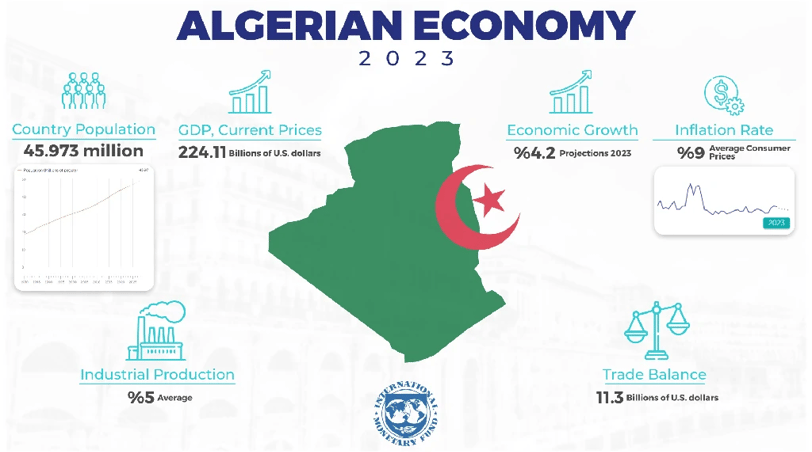Navigating Algeria's Economic Landscape: A Closer Look at the 2023 IMF Report
ALGERIAN ECONOMY INSIGHTS


Algeria, a country rich in hydrocarbon resources, has recently undergone an economic evaluation by the International Monetary Fund (IMF). The 2023 Article IV Mission provides insights into Algeria's economic performance, challenges, and recommendations for the future. In this article, we delve into the key findings of the report and explore the implications for Algeria's economic landscape.
The IMF's report paints a positive picture for the near-term prospects of Algeria's economy. Projections indicate a robust growth of 4.2% in 2023, propelled by strong activity in hydrocarbons, industry, construction, and services sectors. Despite lower hydrocarbon prices, the current account is expected to show a surplus for the second consecutive year, with international reserves at a comfortable level.
The near-term outlook for Algeria's economy is positive, with projected growth at 4.2% in 2023.
Economic activity is strong in various sectors, including hydrocarbons, industry, construction, and services.
The current account is expected to show a surplus for the second consecutive year, despite lower hydrocarbon prices.
Current Economic Snapshot
However, the report highlights persistent challenges. Inflation remains elevated at 9.2%, largely driven by soaring fresh food prices. Sustained high inflation, volatility in hydrocarbon prices, and climate change vulnerability are identified as key risks. Additionally, the fiscal deficit is projected to reach 6.7% of GDP, driven partly by increased public spending, particularly in the public wage bill, transfers, and investment.
Inflation remains high at 9.2%, driven by factors such as elevated food prices, despite some control due to exchange rate appreciation.
Key risks include sustained high inflation, volatility in hydrocarbon prices, and vulnerability to climate change.
Fiscal deficit is projected to reach 6.7% of GDP, partly due to increased public spending.
Challenges and Risks
Future Economic Prospects
Looking ahead to 2024, the outlook remains positive with expectations of continued growth, moderated inflation, and a small current account surplus. However, the fiscal deficit is anticipated to widen further in 2024, raising concerns about financing needs and public debt over the medium term.
The short-term outlook for 2024 is positive, with robust growth, moderated inflation, and a small current account surplus.
However, the fiscal deficit is expected to widen in 2024 due to higher public spending.
Business Climate and Private Investments
The IMF acknowledges Algeria's initiatives to strengthen the business climate, diversify the economy, and promote private investments. Encouragement is given to continue these reforms by removing administrative barriers and enhancing flexibility in product and labor markets.
Recognition of Algerian authorities' initiatives to strengthen the business climate, diversify the economy, and promote private investments.
Encouragement to continue reforms, including removing administrative barriers and enhancing flexibility in product and labor markets


In conclusion, the IMF's evaluation of Algeria's economic landscape for 2023 provides valuable insights and recommendations. While short-term prospects appear favorable, addressing inflation, fiscal deficits, and vulnerabilities to external factors is crucial for sustained and inclusive growth. The proposed reforms, if implemented effectively, have the potential to navigate Algeria towards a more diversified and resilient economic future. The cooperation of Algerian authorities, as acknowledged by the IMF mission, will be instrumental in shaping the success of these recommendations. As the country charts its economic course, a careful balance of fiscal, monetary, and structural measures will be key to unlocking Algeria's full economic potential in the years to come.
Read full IMF report here
Related Stories


